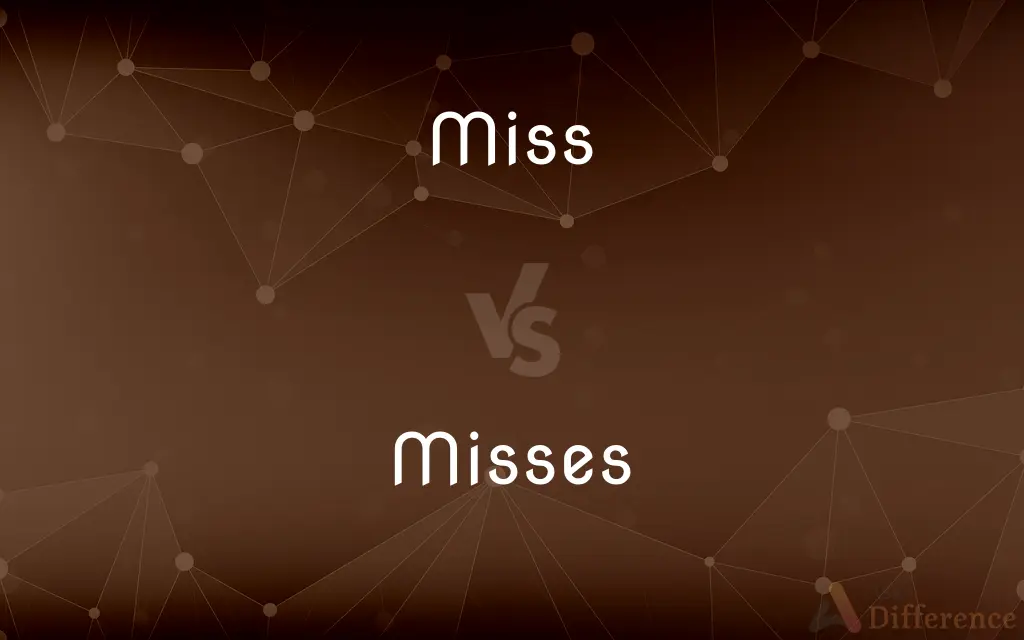Miss vs. Misses — What's the Difference?
By Tayyaba Rehman — Updated on September 4, 2023
"Miss" is a title for an unmarried woman, while "Misses" is a plural form of Miss or a colloquial term for a wife.

Difference Between Miss and Misses
Table of Contents
ADVERTISEMENT
Key Differences
"Miss" is a customary title or form of address for a young or unmarried woman. This title is generally used before a surname or full name, denoting that the individual is not married. On the other hand, "Misses" can serve two purposes. Firstly, it can act as the plural form of "Miss," referring to multiple unmarried women. Secondly, "Misses" can colloquially allude to one's wife.
Considering its grammatical usage, "Miss" is singular in form. You might address a single young woman as "Miss Johnson," especially if her marital status is either unknown or she is unmarried. In contrast, "Misses," when used to represent multiple women, would be applicable in contexts like: "The Misses Johnson are attending the event," implying that there are multiple unmarried women with the surname Johnson attending.
Beyond titles, "Miss" can also be a verb indicating a failure to hit, reach, or come into contact with something. For example, "I will miss the bus if I don't hurry." "Misses" does not usually carry this verb sense; instead, it remains confined to its noun usage related to titles or a wife.
Interestingly, while "Miss" remains quite straightforward in its application, "Misses" can also be seen as a play on words in casual contexts. A man might refer to his wife humorously by saying, "The Misses wants me home early tonight."
Comparison Chart
Basic Definition
Unmarried woman's title
Plural of Miss or colloquial term for wife
ADVERTISEMENT
Usage
Singular form
Plural form or casual reference to a wife
Example Address
Miss Thompson
The Misses Thompson
Context
Formal
Either formal (plural) or casual (wife)
Part of Speech
Noun, Verb
Noun
Compare with Definitions
Miss
A title for an unmarried woman.
Miss Davis is my teacher.
Misses
Colloquial term for one's wife.
The misses wants me to buy milk.
Miss
To fail to reach or strike.
I will miss the target.
Misses
Plural form of Miss, referring to multiple unmarried women.
The Misses Smith are twins.
Miss
To feel the absence of someone or something.
I miss my hometown.
Misses
To refer to more than one young lady in a group.
The Misses in the choir sang beautifully.
Miss
To notice the loss or absence of something.
Did you miss your wallet?
Misses
Title for multiple unmarried sisters living together.
The Misses Lee have lived here for years.
Miss
To fail to attend or experience.
She didn't want to miss the concert.
Misses
Informal reference to a female authority figure.
The misses at the store gave me a discount.
Miss
Miss (pronounced ) is an English language honorific traditionally used only for an unmarried woman (not using another title such as "Doctor" or "Dame"). Originating in the 17th century, it is a contraction of mistress, which was used for all women.
Misses
To fail to hit, reach, catch, or otherwise make contact with
He swung at and missed the ball. The winger missed the pass. The ball missed the basket.
Miss
To fail to hit, reach, catch, or otherwise make contact with
He swung at and missed the ball. The winger missed the pass. The ball missed the basket.
Misses
To be too late for or fail to meet (a train, for example).
Miss
To be too late for or fail to meet (a train, for example).
Misses
To fail to perceive, experience, or understand
I missed my favorite TV show last night. You completely missed the point of the film.
Miss
To fail to perceive, experience, or understand
I missed my favorite TV show last night. You completely missed the point of the film.
Misses
To fail to accomplish or achieve
Just missed setting a new record.
Miss
To fail to accomplish or achieve
Just missed setting a new record.
Misses
To fail to attend or perform
Never missed a day of work.
Miss
To fail to attend or perform
Never missed a day of work.
Misses
To fail to answer correctly
Missed three questions on the test.
Miss
To fail to answer correctly
Missed three questions on the test.
Misses
To fail to benefit from; let slip
Miss a chance.
Miss
To fail to benefit from; let slip
Miss a chance.
Misses
To escape or avoid
We took a different way and missed the traffic jam.
Miss
To escape or avoid
We took a different way and missed the traffic jam.
Misses
To discover the absence or loss of
I missed my book after getting off the bus.
Miss
To discover the absence or loss of
I missed my book after getting off the bus.
Misses
To be without; lack
A cart that is missing a wheel.
Miss
To be without; lack
A cart that is missing a wheel.
Misses
To feel the lack or loss of
Do you miss your family?.
Miss
To feel the lack or loss of
Do you miss your family?.
Misses
To fail to hit or otherwise make contact with something
Took a shot near the goal and missed.
Miss
To fail to hit or otherwise make contact with something
Took a shot near the goal and missed.
Misses
To be unsuccessful; fail
A money-making scheme that can't miss.
Miss
To be unsuccessful; fail
A money-making scheme that can't miss.
Misses
To misfire, as an internal-combustion engine.
Miss
To misfire, as an internal-combustion engine.
Misses
A failure to hit or make contact with something.
Miss
A failure to hit or make contact with something.
Misses
A failure to be successful
The new movie was a miss.
Miss
A failure to be successful
The new movie was a miss.
Misses
The misfiring of an engine.
Miss
The misfiring of an engine.
Misses
Miss Used as a courtesy title before the surname or full name of a girl or single woman.
Miss
Miss Used as a courtesy title before the surname or full name of a girl or single woman.
Misses
Used as a form of polite address for a girl or young woman
I beg your pardon, miss.
Miss
Used as a form of polite address for a girl or young woman
I beg your pardon, miss.
Misses
A young unmarried woman.
Miss
A young unmarried woman.
Misses
Miss Used in informal titles for a young woman to indicate the epitomizing of an attribute or activity
Miss Organization.
Miss Opera.
Miss
Miss Used in informal titles for a young woman to indicate the epitomizing of an attribute or activity
Miss Organization.
Miss Opera.
Misses
Mis·ses A series of clothing sizes for women and girls of average height and proportions.
Miss
Mis·ses A series of clothing sizes for women and girls of average height and proportions.
Misses
Plural of miss
Miss
(ambitransitive) To fail to hit.
I missed the target.
I tried to kick the ball, but missed.
Misses
A range of clothing sizes for women of average height and build.
Miss
(transitive) To fail to achieve or attain.
To miss an opportunity
Misses
Alternative spelling of missus(Mrs)
Miss
(transitive) To avoid; to escape.
The car just missed hitting a passer-by.
Miss
(transitive) To become aware of the loss or absence of; to feel the want or need of, sometimes with regret.
I miss you! Come home soon!
Miss
(transitive) To fail to understand;
Miss the joke
Miss
(transitive) To fail to notice; to have a shortcoming of perception; overlook.
So I'm just going over my early notes, see if I missed anything.
Miss
(transitive) To fail to attend.
Joe missed the meeting this morning.
Miss
(transitive) To be late for something (a means of transportation, a deadline, etc.).
I missed the plane!
Miss
(transitive) To be wanting; to lack something that should be present.
The car is missing essential features.
Miss
To spare someone of something unwanted or undesirable.
Miss me with that nonsense!
Miss
To fail to help the hand of a player.
Player A: J7. Player B: Q6. Table: 283. The flop missed both players!
Miss
(sports) To fail to score (a goal).
Miss
To go wrong; to err.
Miss
To be absent, deficient, or wanting.
Miss
A failure to hit.
Miss
A failure to obtain or accomplish.
Miss
An act of avoidance give}}
I think I’ll give the meeting a miss.
Miss
(computing) The situation where an item is not found in a cache and therefore needs to be explicitly loaded.
Miss
A title of respect for a young woman (usually unmarried) with or without a name used.
You may sit here, miss.
You may sit here, Miss Jones.
Miss
An unmarried woman; a girl.
Miss
A kept woman; a mistress.
Miss
(card games) In the game of three-card loo, an extra hand, dealt on the table, which may be substituted for the hand dealt to a player.
Miss
A title of courtesy prefixed to the name of a girl or a woman who has not been married. See Mistress, 5.
Miss
A young unmarried woman or a girl; as, she is a miss of sixteen.
Gay vanity, with smiles and kisses,Was busy 'mongst the maids and misses.
Miss
A kept mistress. See Mistress, 4.
Miss
In the game of three-card loo, an extra hand, dealt on the table, which may be substituted for the hand dealt to a player.
Miss
The act of missing; failure to hit, reach, find, obtain, etc.
Miss
Loss; want; felt absence.
There will be no great miss of those which are lost.
Miss
Mistake; error; fault.
He did without any great miss in the hardest points of grammar.
Miss
Harm from mistake.
Miss
To fail of hitting, reaching, getting, finding, seeing, hearing, etc.; as, to miss the mark one shoots at; to miss the train by being late; to miss opportunites of getting knowledge; to miss the point or meaning of something said.
When a man misses his great end, happiness, he will acknowledge he judged not right.
Miss
To omit; to fail to have or to do; to get without; to dispense with; - now seldom applied to persons.
She would never miss, one day,A walk so fine, a sight so gay.
We cannot miss him; he does make our fire,Fetch in our wood.
Miss
To discover the absence or omission of; to feel the want of; to mourn the loss of; to want; as, to miss an absent loved one.
Neither missed we anything . . . Nothing was missed of all that pertained unto him.
What by me thou hast lost, thou least shalt miss.
Miss
To fail to hit; to fly wide; to deviate from the true direction.
Men observe when things hit, and not when they miss.
Flying bullets now,To execute his rage, appear too slow;They miss, or sweep but common souls away.
Miss
To fail to obtain, learn, or find; - with of.
Upon the least reflection, we can not miss of them.
Miss
To go wrong; to err.
Amongst the angels, a whole legionOf wicked sprites did fall from happy bliss;What wonder then if one, of women all, did miss?
Miss
To be absent, deficient, or wanting.
What here shall miss, our toil shall strive to mend.
Miss
A young woman;
A young lady of 18
Miss
A failure to hit (or meet or find etc)
Miss
Fail to perceive or to catch with the senses or the mind;
I missed that remark
She missed his point
We lost part of what he said
Miss
Feel or suffer from the lack of;
He misses his mother
Miss
Fail to attend an event or activity;
I missed the concert
He missed school for a week
Miss
Leave undone or leave out;
How could I miss that typo?
The workers on the conveyor belt miss one out of ten
Miss
Fail to reach or get to;
She missed her train
Miss
Be without;
This soup lacks salt
There is something missing in my jewellery box!
Miss
Fail to reach;
The arrow missed the target
Miss
Be absent;
The child had been missing for a week
Miss
Fail to experience;
Fortunately, I missed the hurricane
Common Curiosities
Can "Misses" be used for a group of sisters?
Yes, it can be like, "The Misses Clark," for unmarried sisters.
How is "Misses" different from "Miss"?
"Misses" can be the plural of "Miss" or a colloquial term for a wife.
Can "Miss" also be a verb?
Yes, "Miss" can mean failing to hit, reach, or contact something.
What does the term "the misses" informally refer to?
It often colloquially refers to one's wife.
Do "Miss" and "Misses" have male counterparts?
Yes, "Mr." for men and "Misters" as its plural.
Is "Misses" used as a verb?
No, it's primarily a noun referring to multiple "Miss" or a wife.
Can "Misses" refer to a mixed group of married and unmarried women?
Typically, no. It's for unmarried women or one's wife.
Is "Miss" used globally?
While its usage is widespread, different cultures may have their own titles.
Which is the more formal title: Miss or Misses?
Both can be formal, but "Misses" can also be casual when referring to one's wife.
In which context is "Miss" most commonly used?
In formal settings or when addressing an unmarried woman.
Can "Misses" be used to humorously refer to one's girlfriend?
It's more common for a wife, but contextually it could be used humorously for a girlfriend.
What does "Miss" usually signify?
"Miss" is primarily a title for an unmarried woman.
Is "Miss" always an indicator of marital status?
Primarily, yes, but it can also be a sign of youth or respect.
Can "Miss" be used for a widow?
Typically, "Mrs." is used for widows, but "Miss" can be used if preferred by the individual.
Does "Miss" indicate age?
Not necessarily, but it often refers to younger unmarried women.
Share Your Discovery

Previous Comparison
Proteoglycans vs. Glycoprotein
Next Comparison
Vertical vs. LateralAuthor Spotlight
Written by
Tayyaba RehmanTayyaba Rehman is a distinguished writer, currently serving as a primary contributor to askdifference.com. As a researcher in semantics and etymology, Tayyaba's passion for the complexity of languages and their distinctions has found a perfect home on the platform. Tayyaba delves into the intricacies of language, distinguishing between commonly confused words and phrases, thereby providing clarity for readers worldwide.















































